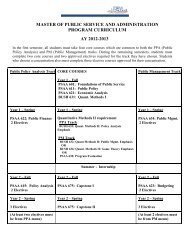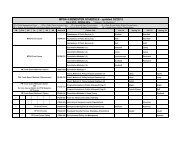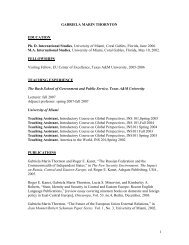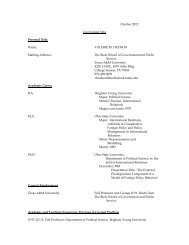Layne - Fall 2012 - Bush School of Government and Public Service
Layne - Fall 2012 - Bush School of Government and Public Service
Layne - Fall 2012 - Bush School of Government and Public Service
You also want an ePaper? Increase the reach of your titles
YUMPU automatically turns print PDFs into web optimized ePapers that Google loves.
one - I strongly suggest that you read Stephen Van Evera, A Guide to Methods for Students <strong>of</strong><br />
Political Science (Cornell University Press, 1997), pp. 89-95, 97-109, 123-128.<br />
NOTE: It is not acceptable to h<strong>and</strong> in the same assignment for more than one course.<br />
Translation: you cannot “recycle” work you have done for other courses for this class.<br />
Draft Paper <strong>and</strong> Presentation: 10% <strong>of</strong> course grade.<br />
Special Research Team Projects on the Shifting Balance <strong>of</strong> Global Power in the Early 21 st Century:<br />
40% <strong>of</strong> course grade. These grades will be assigned on a team basis.<br />
The 22, 29 October <strong>and</strong> 5 November class meetings will be set aside [tentatively] for<br />
presentations <strong>of</strong> draft papers. Each student will make an oral presentation in class based upon a<br />
draft <strong>of</strong> your research paper. The oral presentations will serve as one <strong>of</strong> the bases for class<br />
discussion during these weeks. The draft paper should be reasonably polished, <strong>and</strong> should not<br />
exceed 15 pages in length. The class discussion <strong>and</strong> critique <strong>of</strong> draft papers should provide<br />
feedback <strong>and</strong> suggestions to incorporate into your final paper. The final paper, therefore, should<br />
show significant revision from the draft paper, based on comments from the instructor <strong>and</strong> from<br />
your peers - as well as your own evolved thinking about your topic.<br />
Draft papers should be circulated by email to the instructor <strong>and</strong> to all class members no<br />
later than 48 hours prior to their scheduled presentation in class.<br />
Discussion Leadership: Discussion leadership is a course requirement but will not be graded.<br />
There are two components to discussion leadership: (1) Leading the class discussion <strong>of</strong> the<br />
assigned weekly readings; <strong>and</strong> (2) serving as discussant/commentator on a draft paper<br />
presentation.<br />
All students will be responsible for leading at least one class discussion. Depending on<br />
enrollment, students may be called upon to lead more than one discussion.<br />
Discussion leaders are responsible for discussing the assigned readings for the class session,<br />
raising questions for class discussion, <strong>and</strong> preparing a Power Point presentation that identifies the<br />
key themes <strong>of</strong> the readings <strong>and</strong> sets out a number <strong>of</strong> discussion questions. Discussion leaders are<br />
to go beyond providing a mere summary <strong>of</strong> the reading (because all students are required to do the<br />
assigned readings). The function <strong>of</strong> discussion leaders in not to regurgitate the assigned readings,<br />
but rather to engage the material, highlight the main points, <strong>and</strong> get the class involved in debating<br />
<strong>and</strong> discussing the material. You should also feel free to bring up what you think is wrong, or<br />
missing, from the arguments made in the readings under discussion. Discussion leaders will be<br />
evaluated on the basis <strong>of</strong> the substance <strong>and</strong> style <strong>of</strong> the presentation, as well as on the quality <strong>of</strong> the<br />
Power Point presentation <strong>and</strong> discussion questions. The instructor will be looking especially for<br />
evidence that you have carefully read <strong>and</strong> thought about the assigned readings. Your<br />
presentations are expected to cover the main points, issues, <strong>and</strong> arguments that arise from the<br />
readings. Discussion leaders should situate the readings theoretically, critique them, dissect the<br />
causal logics <strong>of</strong> the arguments, <strong>and</strong> consider their policy implications.<br />
3









